|
|
|
Sort Order |
|
|
|
Items / Page
|
|
|
|
|
|
|
| Srl | Item |
| 1 |
ID:
179875


|
|
|
|
|
| Summary/Abstract |
Based on the monthly panel data of the Shanghai stock market from November 2012 to November 2016, this article studies the impact of the Shanghai–Hong Kong Stock Connect on the stability of stock prices in different periods and in varying degrees of market openness by using the difference-in-differences (DID) fixed effects model. The study finds that the implementation of the Shanghai–Hong Kong Stock Connect effectively reduces the volatility of underlying stocks and that the short-term increase in volatility is merely a temporary phenomenon. Under a comparatively higher degree of market openness, the Shanghai–Hong Kong Stock Connect will also have an impact on extreme volatility of underlying stocks, reducing the jump risk in stock prices and speculation on China's A-share market. However, it also increases the stock price crash risk and brings about market instability. Of particular interest, the observed increase in stock price crashes is related to firms with poor information disclosure practice.
|
|
|
|
|
|
|
|
|
|
|
|
|
|
|
|
| 2 |
ID:
159563


|
|
|
|
|
| Summary/Abstract |
This article analyses the impact of China's outward foreign direct investment (OFDI) to 48 "One Belt, One Road" (OBOR) countries on the extensive and intensive margins of trade using Chinese OFDI data from 2004 to 2014. The study yields the following key findings. First, Chinese OFDI exerts a trade creation instead of a trade substitution effect on total export volumes. Second, in terms of the technological sophistication of exports, Chinese OFDI has a notable effect in boosting exports with low or medium levels of technological content. Finally, there is no strong evidence that Chinese OFDI significantly expands the number of export product categories. These findings imply that the trade creation effect of Chinese OFDI derives mainly from increases in the intensive rather than the extensive margin of trade.
|
|
|
|
|
|
|
|
|
|
|
|
|
|
|
|
| 3 |
ID:
132980
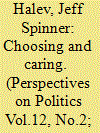

|
|
|
|
|
| Publication |
2014.
|
| Summary/Abstract |
Choice and markets have always been central to liberalism. Liberals wants people to choose their occupation, their partners, and what goods to buy. All liberals agree that making choices is central to the autonomous life. But the scope and conditions of choice quickly becomes controversial among liberals, as the four books under review reveal. Joan Tronto and Michael Sandel worry about the spread of market thinking to all other spheres of life, John Tomasi argues that too many contemporary liberals underestimate the importance of economic liberty, while Sarah Conly argues that we have a large swath of empirical evidence to question the idea that individuals can readily make correct rational decisions. Conly is not against individual autonomy, but she urges us to recognize autonomy's limitations. While political theorists are often reluctant to think about policy, doing so is certainly a virtue when the topic is markets and choice; one of the strengths of Conly's and Tronto's books is their willingness to apply their arguments to specific policy realms.
|
|
|
|
|
|
|
|
|
|
|
|
|
|
|
|
| 4 |
ID:
130929
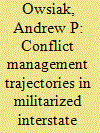

|
|
|
|
|
| Publication |
2014.
|
| Summary/Abstract |
When multiple third parties intervene diplomatically in the same dispute, are their interventions interdependent? Although theoretical and empirical evidence suggests that they are, most conflict management research fails to theorize about and model this interdependence directly. The current project breaks with this tradition by advancing the new concept of a conflict management trajectory-the idea that conflict management efforts evolve over the course of a conflict and successive efforts inform one another. After discussing the rationale for and theoretical foundations underlying trajectories, I construct these trajectories empirically, summarize and discuss some of their characteristics, and create a typology to describe and organize them. In the process, I demonstrate that trajectories possess properties that clearly differentiate them from isolated interventions (the alternative) and display numerous general patterns. Each of these, in turn, suggests that trajectories deserve greater study as we seek to integrate and expand our understanding of international conflict management.
|
|
|
|
|
|
|
|
|
|
|
|
|
|
|
|
| 5 |
ID:
141477
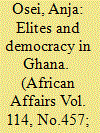

|
|
|
|
|
| Summary/Abstract |
This article presents new theoretical and empirical insights into democratization in Africa, using the typology developed by John Higley and Michael Burton to understand elite interaction in Ghana. Social network analysis (SNA) is used to test the main proposition of the Higley/Burton theory, namely that a ‘liberal democracy is impossible without a consensually united elite’. Empirical evidence is provided from a unique data set that maps the interaction patterns between Members of Parliament elected to the Ghanaian legislature in 2012. The article shows that MPs in Ghana form a dense and strongly interconnected network bridging ethnic and party cleavages, and that MPs from different parties have developed a measure of trust in one another. These findings not only support Higley and Burton's claim that elite integration is conducive to stable democracy, but also point to new directions in African Studies by demonstrating the capacity of actor-centric approaches to explain processes of democratization in countries that lack the classic structural preconditions for consolidation.
|
|
|
|
|
|
|
|
|
|
|
|
|
|
|
|
| 6 |
ID:
087730
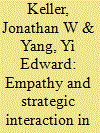

|
|
|
|
|
| Publication |
2009.
|
| Summary/Abstract |
Empirical evidence supports the poliheuristic (PH) theory of decision making, which states that leaders typically employ a two-stage non-compensatory decision-making process. In stage one leaders reject options that do not meet some minimum criteria of acceptability on one or more dimensions, and in stage two they choose among the remaining options using a more rational utility-maximizing rule. While PH theory has primarily been applied at the monadic level, to explain the process and content of states' decisions, we contend it has important implications for strategic interaction and can help to explain outcomes in world politics. Specifically, we argue that a crucial variable shaping crisis outcomes is the degree to which leaders' non compensatory decision criteria in stage one include options' acceptability to the opponent. When leaders empathize with their opponent and screen out those options the opponent considers unacceptable, crises will be resolved more quickly and with a lower likelihood of escalation. Empathy introduced during the second, utility-maximizing stage, may also dampen conflict but is less effective than stage one empathy. We illustrate this dyadic non compensatory model by examining two cases involving the U.S.-China and U.S.-Iraq bilateral relationships.
|
|
|
|
|
|
|
|
|
|
|
|
|
|
|
|
| 7 |
ID:
124481
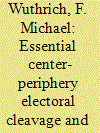

|
|
|
|
|
| Publication |
2013.
|
| Summary/Abstract |
For nearly forty years, scholars have utilized the metanarrative of a center-periphery cleavage first proposed by ?erif Mardin to explain a variety of phenomena in Turkish politics and society. When used to interpret electoral cleavages in the multiparty period, however, a center-periphery cleavage cannot effectively explain electoral outcomes. Focusing on the initial stage of multiparty competition, when the cleavage is often said to have been most salient, this article explores the empirical evidence to show that the concept as commonly employed has actually confounded an effective understanding of electoral behavior in Turkey. Rather than demonstrating a clear electoral division between the elites of the social center and the masses during this period, the article reveals two distinct cross-cutting patron-client strategies used by elite-dominated parties to cater to the rural population. The significant patterns of change in Turkey's electoral outcomes over time further illustrate the need to focus on how political parties and elites accumulate votes-that is, on their vote targeting strategies-rather than rely on static sociopolitical cleavages.
|
|
|
|
|
|
|
|
|
|
|
|
|
|
|
|
| 8 |
ID:
131008
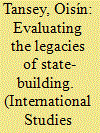

|
|
|
|
|
| Publication |
2014.
|
| Summary/Abstract |
What impact do international state-building missions have on the domestic politics of states they seek to build, and how can we measure this impact with confidence? This article seeks to address these questions and challenge some existing approaches that often appear to assume that state-builders leave lasting legacies rather than demonstrating such influence with the use of carefully chosen empirical evidence. Too often, domestic conditions that follow in the wake of international state-building are assumed to follow as a result of international intervention, usually due to insufficient attention to the causal processes that link international actions to domestic outcomes. The article calls for greater appreciation of the methodological challenges to establishing causal inferences regarding the legacies of state-building and identifies three qualitative methodological strategies-process tracing, counterfactual analysis, and the use of control cases-that can be used to improve confidence in causal claims about state-building legacies. The article concludes with a case study of international state-building in East Timor, highlighting several flaws of existing evaluations of the United Nations' role in East Timor and identifying the critical role that domestic actors play even in the context of authoritative international intervention.
|
|
|
|
|
|
|
|
|
|
|
|
|
|
|
|
| 9 |
ID:
165605


|
|
|
|
|
| Summary/Abstract |
�e repeal of Qi Yuling v. Chen Xiaoqi in 2008 seemed to bring an
o�cial end to China’s judicialization of its constitution. �e application of the Chinese constitution has since been banned from judicial
practice, although legal disputes that entail constitutional arguments
nevertheless continue to be argued before the courts. �is article is
based on a study of more than 900 court cases heard between 2014
and 2016 in which judges referred to the constitution for their legal
reasoning. �e cases were retrieved from the China Judgements Online
database. In the article, I demonstrate the mechanism and e�ects of
this low-key constitutional jurisprudence in three case groups depicting
di�erent understandings of the constitution at the local level.
|
|
|
|
|
|
|
|
|
|
|
|
|
|
|
|
| 10 |
ID:
124898


|
|
|
|
|
| Publication |
2013.
|
| Summary/Abstract |
Does empirical evidence support treating "nationalism" and "patriotism" as separate concepts in China and is there a relationship between strong nationalist/patriotic attitudes and foreign policy preferences? To analyse the construction of Chinese national identity, Chinese university students (N = 1346) took part in a survey in Beijing in spring 2007. The data supported the assumption of a conceptual separation between nationalism and patriotism. CCP members and students from rural backgrounds were more nationalistic than non-members and students with urban upbringings. Moreover, nationalism had a stronger link to foreign policy preferences than patriotism, and respondents with a greater degree of nationalism were less likely to favour international cooperation and more likely to prefer protectionist policies. The associations of nationalism and patriotism with foreign policy attitudes, and the contribution of other potential explanatory factors to the relationship between nationalism, patriotism and policy attitudes were explored with linear regression models.
|
|
|
|
|
|
|
|
|
|
|
|
|
|
|
|
| 11 |
ID:
171491


|
|
|
|
|
| Summary/Abstract |
Consumer behavior in rural ecosystems represents considerable variations vis-à-vis consumption of energy in different forms. Consumer preference towards any given energy service is a function of geographical situatedness, local customs, traditions and tastes including local weather conditions. Rural flavour of energy poverty has a distinctive micro-character which can be understood in terms of socio-cultural behaviourism of an energy consumer. This geo-spatial flavour further appears to be a function of socio-economic functionalities of communities which could be socio-culturally- similar or different. Energy poverty is saddled with conceptual concentricity. Empirical evidence shows that the phenomena and the concept both are vulnerable in terms of operationalization by means of a single universal definition. It exhibits contrarian hues in terms of availability, access, distribution, affordability, and acceptability of an energy service. This study presents an alternative approach to understanding of both-the phenomena and the associated conceptual construct. The present paper is an explicit representation of the everyday grain of energy needs and consumption patterns in six rural socio-cultural systems. This study based upon fieldwork in the six villages viz., Bhadroya, Thapkour and Gaghwal (Kangra District) and Kakira, Bidingi and Talhara (Chamba District) throws up interesting findings which challenge the contemporary discourse on energy poverty.
|
|
|
|
|
|
|
|
|
|
|
|
|
|
|
|
| 12 |
ID:
125020


|
|
|
|
|
| Publication |
2013.
|
| Summary/Abstract |
Various explanations have been advanced for the January effect in the existing literature, but no consensus has been arrived at to distinguish one particular explanation from any others. In this paper, a time-series GARCH-M model with conditional variance as a proxy for market systematic risk is applied to investigate the seasonal effects in four countries with different tax system and tax year end: the USA, the UK, China and Australia. Empirical evidence showed a January effect in the USA, a January and an April effect in the UK, a July effect in Australia and no significant seasonal effect in China. This pattern consistently links to tax year end and the tax system in the sample countries; however, no clear evidence has been found to support the proposition that market risk is higher or priced highly only in calendar months with a seasonal effect. However, to reflect the seasonal effect, an interactive dummy variable is added into the time-series GARCH-M model, and the seasonal effects are explained away. The results of the sampled countries support the proposition that market volatility increases when it is close to the date of financial statement performance due to the uncertainty of the financial information.
|
|
|
|
|
|
|
|
|
|
|
|
|
|
|
|
| 13 |
ID:
168401


|
|
|
|
|
| Summary/Abstract |
Half a century after the “Second Great Debate” in international relations (IR) started, scholars still perceive the qualitative versus quantitative division as their principal divide, and yet we do not have a good grasp of the impact of this divide. My research explores how the divide shaped the incentives and behaviors of scholars and influenced the organization of our academic communities and knowledge production. The impact of the divide expressed itself in the distribution of research among methodologies in terms of relative quantity and impact. Less obviously, and yet more importantly, the divide influenced the distribution of quantitative research among different institution types, across fields and journals, and with respect to policy engagement. Using the TRIP database of 7,792 IR articles in twelve top journals from 1980 to 2014, I classify journal articles into three categories—quantitative-only, qualitative-only, and mixed-methods—and categorize author institutions into similar types—publishing quantitative research only, producing nonquantitative work only, and publishing various proportions of quantitative research. Notably, qualitative and quantitative works switched positions over time in terms of relative quantity and impact, with quantitative research more likely published but only slightly more cited in the recent decade. More importantly, the divide produced other less obvious but more serious outcomes. Among 1,111 institutions that ever published IR research in twelve top journals over thirty-five years, two-thirds published nonquantitative research only; fifty-three institutions published more than half of all quantitative articles; institutions publishing quantitative-only or nonquantitative-only research constituted two modal categories. Political science journals published more quantitative research, persistently and with growing convergence; IR journals also evolved toward publishing more quantitative research though with persistent divergence and forming two clusters. Quantitative articles and political science journals were significantly less engaged in providing policy prescriptions than qualitative articles and IR journals. To overcome this lasting and self-perpetuating divide, we must better understand its impact, learn to appreciate alternative approaches, and change the way we train future scholars.
|
|
|
|
|
|
|
|
|
|
|
|
|
|
|
|
| 14 |
ID:
133656
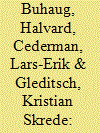

|
|
|
|
|
| Publication |
2014.
|
| Summary/Abstract |
Much of the recent research on civil war treats explanations rooted in political and economic grievances with considerable suspicion and claims that there is little empirical evidence of any relationship between ethnicity or inequality and political violence. We argue that common indicators used in previous research, such as the ethno-linguistic fractionalization (ELF) and the Gini coefficient for income dispersion, fail to capture fundamental aspects of political exclusion and economic inequality that can motivate conflict. Drawing on insights from group-level research, we develop new country-level indices that directly reflect inequalities among ethnic groups, including political discrimination and wealth differentials along ethnic lines. Our analysis reveals that these theoretically informed country profiles are much better predictors of civil war onset than conventional inequality indicators, even when we control for a number of alternative factors potentially related to grievances or opportunities for conflict.
|
|
|
|
|
|
|
|
|
|
|
|
|
|
|
|
| 15 |
ID:
144043


|
|
|
|
|
| Summary/Abstract |
Status concern and feelings of relative deprivation affect individual behaviour and well-being. Traditional norms and the alarming inequality in China have made relative deprivation increasingly intense for the Chinese population. This article reviews empirical literature on China that attempts to test the relative deprivation hypothesis, and also reviews the origins and pathways of relative deprivation, compares its economic measures in the literature and summarises the scientific findings. Drawing from solid empirical evidence, the author discusses the important policy implications on redistribution, official regulations and grassroots sanctions, and relative poverty alleviation.
|
|
|
|
|
|
|
|
|
|
|
|
|
|
|
|
| 16 |
ID:
126471
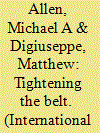

|
|
|
|
|
| Publication |
2013.
|
| Summary/Abstract |
International relations scholars have previously argued that states facing budget constraints will join alliances to free resources for domestic spending. In this paper, we focus on the primary mechanism by which leaders have relaxed this constraint: sovereign borrowing. Sovereign debt enables states to maintain stable tax rates while increasing expenditures to confront budgetary emergencies. Affordable access to credit, then, serves as both a source of power and an important buffer between security and the political consequences of fiscal policy. States that lack the confidence of investors must make tough choices between continued security and their electoral fortunes. We suggest that as governments lack access to affordable credit, they will substitute military capacity with alliance formation. Alliances provide a means for leaders to offset the loss of flexibility from diminished access to credit without disturbing the domestic political economy. Using previous models of alliance formation as a guide, our empirical evidence indicates that states that have a hard time borrowing are more likely to form an alliance than those states with affordable access to credit markets.
|
|
|
|
|
|
|
|
|
|
|
|
|
|
|
|
|
|
|
|
|